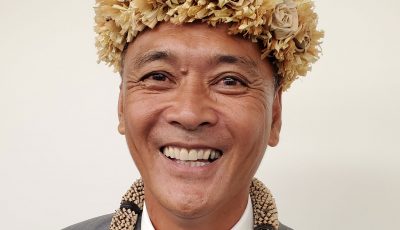Cutback in parole period for Chinese, Russian tourists eyed
A resolution that urges Gov. Ralph DLG Torres to shorten the length of stay of tourists under the Guam-CNMI parole program from the current 45 days to not more than 15 days is being studied.
Rep. Ivan A. Blanco (R-Saipan) has introduced House Resolution 20-09 that seeks to supports shortening the stay period of tourists from China and Russia from a maximum of 45 days to a maximum of 15 days. The resolution is still waiting for crucial data from federal agencies.
H.R. 20-09, according to its author Blanco, seeks to limit the stay period of specific tourists due to a “significant percentage” of parole violations through overstaying, working illegally, and birth tourism.
“[The resolution] is just trying to limit the…authorized days [of stay] of Chinese and Russian [visitors] from 45 days to 15 days because we are trying to prevent [birth tourism],” said Rep. Gregorio M. Sablan Jr. (R-Saipan).
Sablan chairs the House Federal and Foreign Affairs Committee.
According to Sablan, the committee is trying to meet with agents from Immigration and Customs Enforcement to “get some information” on the number of overstaying tourists, the number of illegal tourists, and more.
“Those are questions that need to be answered,” he added. “Do they have an adequate number of agents here?”
Sablan said that members of the federal agencies the committee reached out to reportedly claimed that they were not at liberty to answer questions.
“As a citizen of the CNMI, we are all concerned with what is happening on our islands, most specially concerning birth tourism and illegal aliens,” he said. “[Visitors] are welcome to come and stay, but [they should] stay legally.”
Rep. Edwin K. Propst (Ind-Saipan) questioned whether shortening the length of stay for Chinese and Russian passport holders would appear discriminatory.
“We need to be very careful in [shortening the length of stay]. Tourism is important to us; we depend on all markets,” he said.
According to Sablan, the language would be tweaked once data from the Department of Homeland Security is obtained.
“…If we [push through with HR 20-09], it could have a severe impact on our tourism, so we need to be smart in imposing something while at the same time we are not being discriminatory because we are just trying to address issues affecting our islands,” he said.
According to FFA member Rep. Vinson Sablan (Ind-Saipan), all the committee wants are answers.
“We get asked day in and day out on what is going on with [overstaying tourists], birth tourism, parole program, visa waiver program… These are questions we could answer [only] to a certain extent,” he said, adding that the real answers to the questions come from ICE and U.S. Citizenship and Immigration Services staff.
“We do not have jurisdiction over the staff of USCIS [and the other related agencies], but the issue-at-hand is happening on our islands and we want that information,” he said. “Do they have that information? What approach are they taking to battle this issue of [overstaying tourists]?”
H.R. 20-09 has been tabled until the meeting with ICE.

























